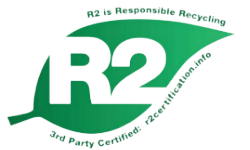E-Waste Disposal: Why You Should Recycle E-Waste Properly
Raise your hand if you’ve ever experienced this scenario: your electronics have reached the end of their life, and it’s time to purchase new software. What do you do with the old electronics? More often than not, people tend to throw electronics in the trash as a means of e-waste disposal.
Unfortunately, electronic waste cannot simply be thrown away because of two factors:
It puts your corporate security at risk
those old devices contain sensitive data which leave you vulnerable to hacks
It’s not environmentally friendly
Old hardware contains components that are extremely harmful to the environment
So what was the solution to these e-waste disposal issues?
In this blog post, we’ll explain why recycling your electronic garbage is a more eco-friendly and secure solution, as well as how to properly dispose of it.
E-Waste Disposal: The Environmental Impact
The majority of hardware on the planet is made up of two main components.
- Metals
- Plastics
The grim reality is that when gadgets are discarded in landfills, both metals and plastics degrade in ways that might harm the environment. This includes the water, earth, plants, and animals in their surrounding environment.
Let’s look at the consequences of inappropriate e-waste disposal in more detail.
E-Waste Metals Effects
Some office hardware products are simply tossed away in the dumpster each year, including:
- Computers
- Wires
- Smartphones
- Servers
Almost all of these products contain metals. When those metals sit in landfills without being recycled, they oxidize and ionize in the soil (meaning they’re affected by oxygen and they break down).
Metals in e-waste disposal hardware like lead, cadmium, and mercury contain toxic chemicals which are released when they break down.
E-Waste Plastic Effects
Plastics are a major environmental concern because they don’t break down the way other materials do. When they degrade, they become microplastic particles.
Sadly, microplastic particles are harmful to plants, animals, and fish. Humans consume all of those food sources, meaning that we’re ingesting microplastics, too.
E-Waste Security Risk of Disposing Old IT Assets
When you toss out old corporate hardware, you’re creating an enormous cybersecurity risk.
We expect the IT department to wipe all devices before they’re ready for decommissioning. However, the IT department doesn’t have the tools or the resources to remove all possible data from a device before it leaves a firm’s doors.
Hackers Can Access Your Digital Data
Over the years, data recovery tools have become stronger and better able to recover information off devices. So, even if you’ve invested in bolstering your digital security, you’re still jeopardizing your company by not utilizing secure e-waste disposal techniques.
If there’s still data sitting on your devices even after you’ve wiped them, you’re at risk in 2 ways:
Run into legal problems
You’re vulnerable to litigation due to a breach
Get hacked
Hackers can breach your corporate IT systems
With legal, readily available software, hackers can access the files and information you thought you had gotten rid of. Then, they can infiltrate your company and steal valuable data, leaving you open to litigation.
For more information, contact us.


